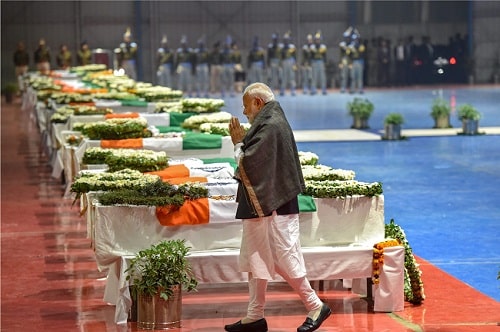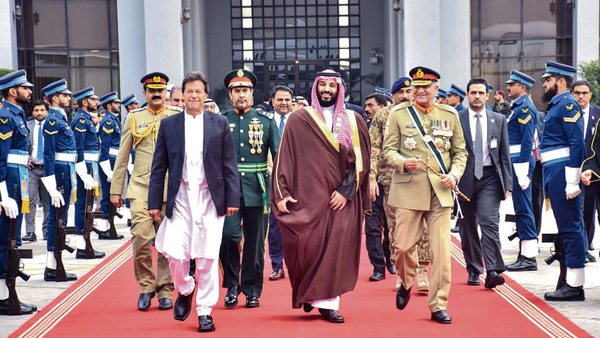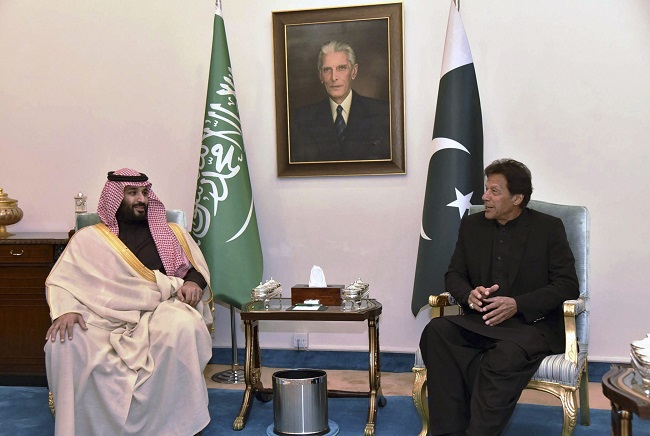While coming to terms with the horrific terrorist attack on a CRPF convoy at Pulwama in Kashmir, it becomes important to see Pakistan’s reaction to the carnage that it has sponsored. Pakistan has taken military, political and diplomatic actions with such clinical precision that can only be the outcome of previous knowledge of an incident or good experience in dealing with such issues.
Within no
time of this unfortunate incident, Pakistan Army leaked out information of its
troops on the Line of Control (LOC) and the “Working Boundary” (Pakistan’s
terminology for the International Border) having been placed on “High Alert,” in
view of India’s “war mongering” and calls for “revenge.”
Having sent out an indication of being prepared for a military strike by
India, Pakistan went into overdrive to control the situation politically and
diplomatically. Most perfidiously, it rejected Indian “allegations” linking the attack to
the country. “We strongly reject any insinuation by elements in the Indian
media and government that seek to link the attack to Pakistan without
investigations,” the Pakistani Foreign Office said in a statement.
The next
step was initiation of a diplomatic blitzkrieg in which first to be invited for
a briefing by Foreign Secretary Tehmina Janjua were
the Ambassadors of the P-5 Nations– US, China,
Russia, Britain and France. Janjua, once
again and most perfidiously, rejected Indian allegations against Pakistan and
noted, “A familiar Indian pattern of immediate and reflexive assignment of
blame on Pakistan without investigations.”
Pakistan’s sophisticated propaganda machinery was then put into
overdrive. In all languages and all channels of the country, India was
portrayed as an “Occupation Force” against whom the Kashmiris are revolting. Other
propaganda themes included terming the attack as “a conspiracy to help Indian
Prime Minister Narendra Modi win the general elections” and “deflect attention
from the trial of Kulbhushan Jadhav by whipping up anti-Pakistan frenzy.” Prime
Minister Modi was also called, “the face of an internationally notorious
terrorist organisation (RSS).”
Pakistan’s Foreign Minister Shah Mehmood Qureshi has been at
great pains to emphasise that “the Indian dream of diplomatically isolating
Pakistan would never come true…. Meetings with German, Canadian, Uzbek foreign
ministers and Afghan president have shown that India’s claim of diplomatically
isolating Pakistan has failed,” he told the media in Germany.
Having taken all initial steps, Pakistan, on the second day
and beyond, is building up a propaganda narrative that highlights India as an
aggressor in Kashmir. Its media has spoken extensively about withdrawal of
security of Kashmiri leaders and the targeting of Kashmiris by “angry mobs”
across India. It has specifically mentioned imposition of curfew in Jammu due
to mob violence. “Hindu
fanatics affiliated with ruling Bharatiya Janata Party (BJP), Rashtriya
Swayamsevak Sangh, Bajrang Dal, Shiv Sena, Vishwa Hindu Parishad and other
extremist organisations raised anti-Kashmir, anti-Pakistan and other
provocative slogans,” says the Express Tribune, a well-known English newspaper of
Pakistan. The narrative of Kashmiris being
targeted across India has been played out by giving names and places including
statements by the so-called victims. From where Pakistan gathered this
information is anybody’s guess.
India is being referred to as the “Republic of Delusion” and
it is being insinuated that the country has, “blinded itself to the reality
that its problem is not Pakistan but its own savage treatment of the people of
Occupied Kashmir.”
The aforementioned makes it quite obvious that Pakistan is
not going to take the pressure being built by India lying down. It is, in fact,
ready to fight back every inch of the way on all fronts including the economic,
diplomatic and military options that India would be considering. India,
therefore, needs to be ready for a long haul for which patience and confidence
in her abilities need to remain intact.
Emotions of the people of India in the wake of this dastardly
terrorist attack are understandable. The situation, however, demands a fair
degree of thought being given to the options of retribution available. The
foremost requirement is strengthening of the internal security mechanism since
an enemy should always be tackled from a position of strength. The voice of
Kashmir should resonate for India even as the agents of Pakistan in Kashmir are
neutralised in totality; the separatists and divisive elements should be
subjected to the harshest treatment under law to set an example for those
inclined towards pursuing anti-national activities at the behest of the enemy.
The sources of radicalisation of youth need to be nipped in the bud regardless
of political feathers and religious sentiments ruffled. Counter-terrorist
operations need to gain momentum to finish off the remnants of terrorism. At
the same time, security procedures need to be strengthened to ensure that own
forces are not subjected to a terrorist attack or related mishaps.
It is important to hit hard at Pakistan’s weak points. The weakest at the moment is its precarious financial condition, the huge wave of unrest palpable in all provinces other than Punjab and the virtual takeover of the country by fundamentalist forces.
India needs to impress upon the international community the
need to ensure that the financial bailout for Pakistan comes only with a caveat
of visible action against the terrorist and fundamentalist infrastructure being
nurtured on its soil. The fact that Chinese assistance is coming with the
intention of converting Pakistan into a virtual colony needs to be impressed
upon the common people of the country who will be the worst sufferers. The
genuine problems being faced by the people, especially the disputed status of
Balochistan and Pakistan Occupied Jammu and Kashmir (POJK), need to be
highlighted as an issue of global concern.
Seeking retribution with a limited military strike may offer a morale boost for the country but it will not have any far-reaching impact. An all out war will also remain inconclusive in the long run even if India emerges with a resounding victory. What would pay long term dividends is an all compassing strategy which builds gradual but sustained pressure till the end point is not achieved.











